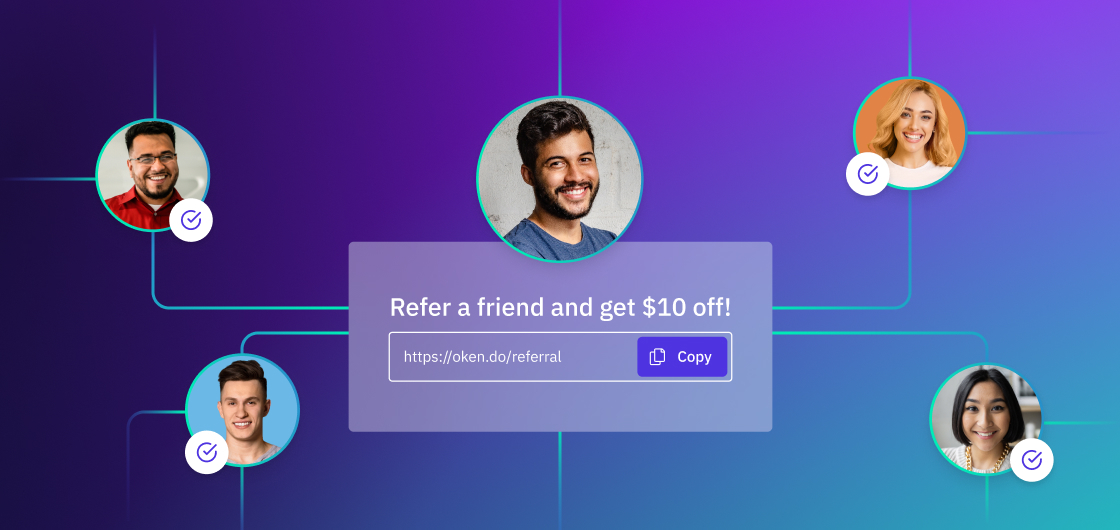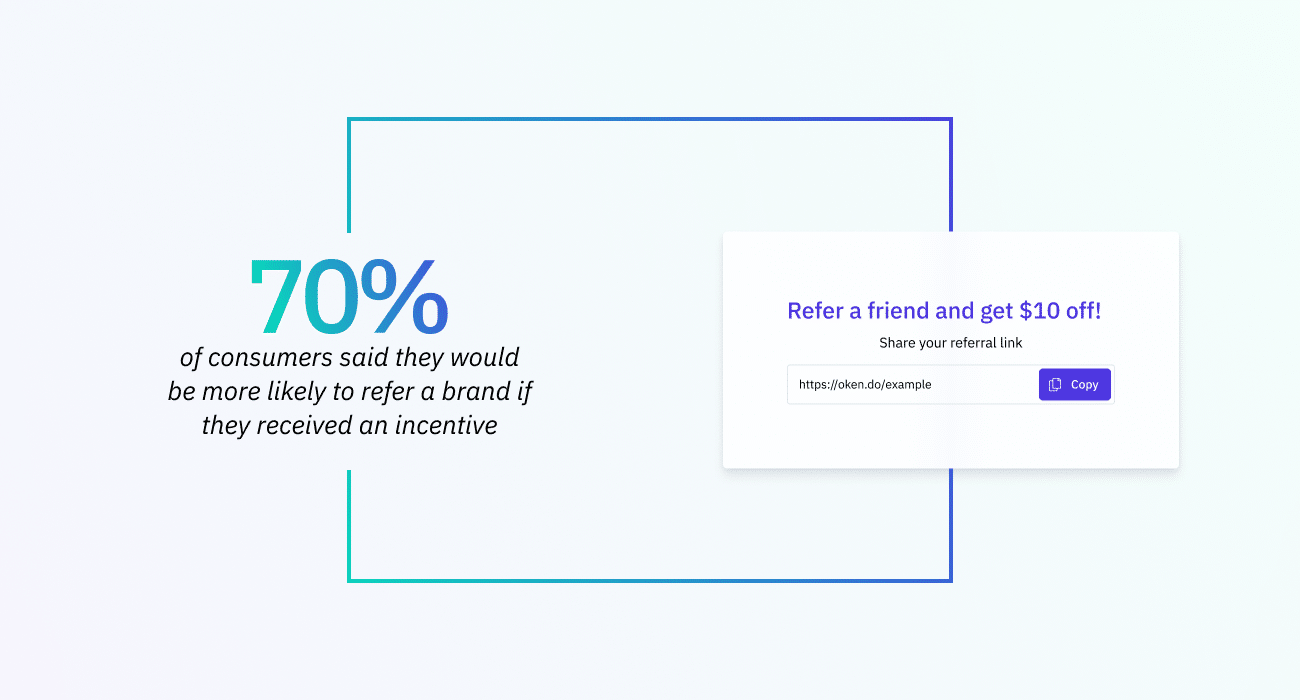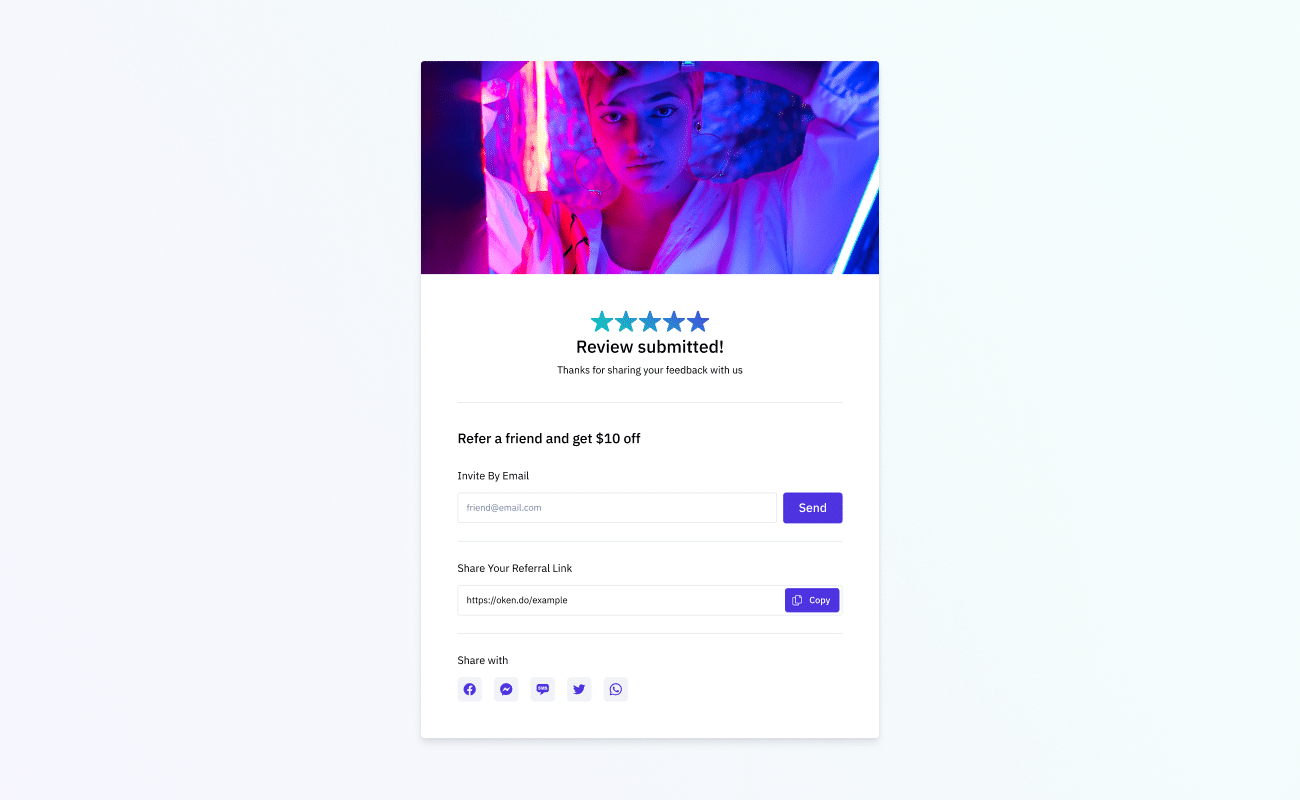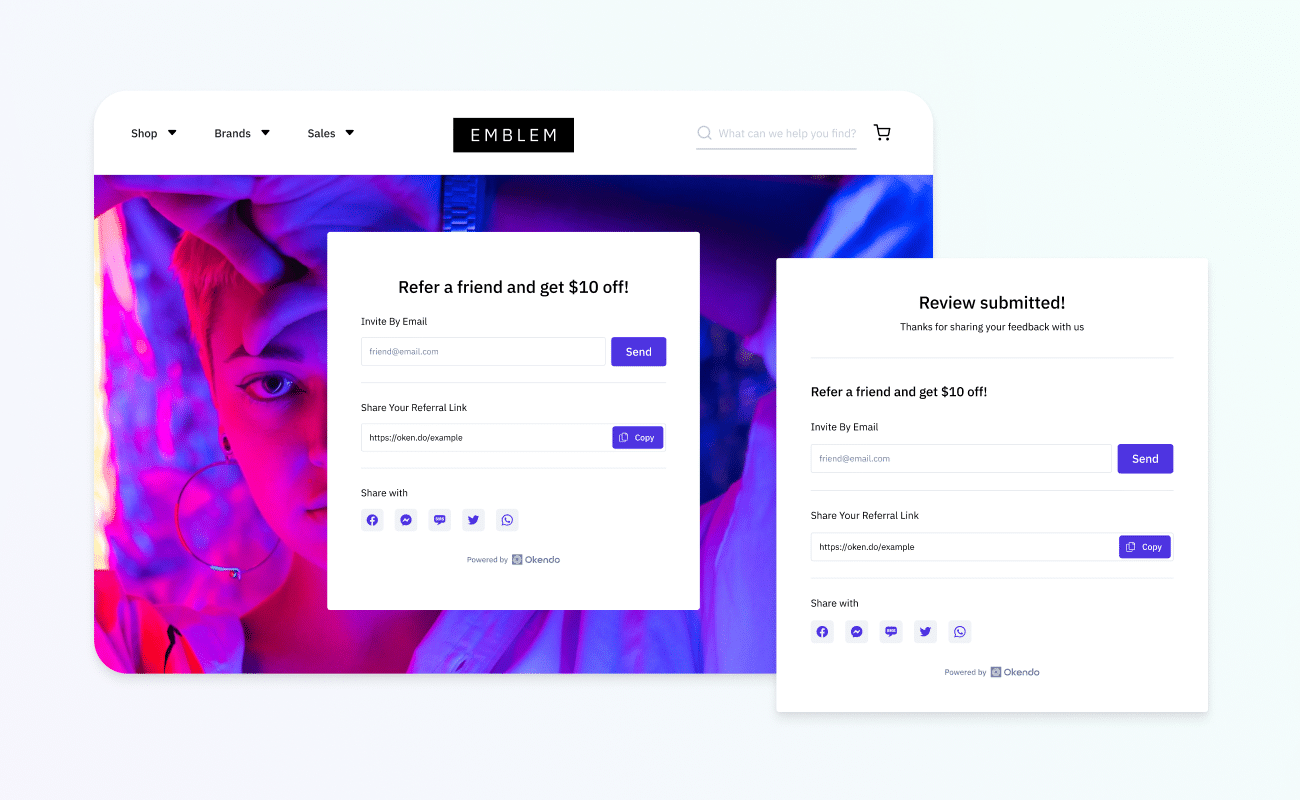
- Customer Loyalty
- Customer Retention
How to Measure Customer Loyalty in 2024: The 9 Best Ways
Megan Wenzl | Mar 14, 2024
Jul 12, 2023 | 12 minute read

Megan Wenzl
Content Marketing Manager
In light of economic uncertainty and ongoing concerns around inflation, consumers today are making fewer purchases. In fact, according to a recent Okendo survey on loyalty and retention, 80% of consumers are now cutting back on their spending to some degree, while 34% are cutting back significantly.
For Shopify brands, a decidedly more reluctant consumer is rarely an indicator of easy times ahead. And when you combine a decrease in spending with increased competition from direct-to-consumer (DTC) brands, as well as customer acquisition costs that have risen by as much as 60% in a five year period, it’s clear that many brands will need to rethink their overall strategy if they hope to stand out and remain competitive despite these considerable challenges.
Perhaps more than anything, successfully navigating these challenges will require a unique focus on customer loyalty. After all, when consumers get serious about cutting back on spending, the purchases they do decide to make are bound to be reserved for their absolute favorite brands and products. This holds true even in good economic times — customers purchase from brands they are loyal to. Moreover, as marketing teams come under increased pressure to optimize their budgets and prove ROI, the ability to utilize your most loyal customers as brand advocates becomes more valuable than ever.
This is where referral marketing comes in: by incentivizing satisfied customers to spread the word about your brand to friends and family, you can begin to build an effective, sustainable inflow of potential new buyers, while significantly reducing customer acquisition costs and raising brand awareness.
In the following guide, we’ll define referral marketing and explore its many benefits, before highlighting some particularly effective referral marketing strategies you can implement.
When a customer is particularly satisfied with a purchase, it increases the chances that they will recommend that brand or product to their friends and family. Referral marketing is a strategy that aims to maximize these recommendations by not only optimizing customer experiences, but actively reaching out and even incentivizing satisfied customers to spread the word to other consumers.
Importantly, an effective referral marketing strategy should also leverage a seamless referral process, making it easy for customers to recommend your brand without feeling inconvenienced. When done right, this strategy will motivate customers to advocate for your products, while benefiting your brand through heightened awareness, as well as a consistent stream of opportunities to convert new first-time shoppers into loyal customers.
With plenty of other strategies at your disposal, it’s important to understand exactly what makes referral marketing so effective, and why it’s quickly become a crucial component of your marketing mix. Here are some specific benefits to consider:
As customer acquisition costs (CAC) continue to soar, referral marketing has the immediate advantage of being far less costly than many other strategies. This is in part because beyond the offer of referral incentives, such as discounts on future purchases, mobilizing customers as brand advocates costs virtually nothing compared to the much higher price tag of paid sponsorships or advertisements.
Moreover, in addition to being less costly, referral marketing has also been shown to be one of the most effective strategies when it comes to improving conversion rates. In fact, according to Adobe, referral marketing is often the best performing acquisition channel for driving conversions, leading to conversion rates of nearly 4X higher than the average rate of all channels.
Consumers today want to know that they’re truly valued by the brands they choose to purchase from, and an incentive-based referral marketing strategy communicates your willingness to give back to customers in exchange for their loyalty to your brand.
In addition to showing customers that you value their business, incentives are incredibly effective when it comes to maximizing participation in your referral program. In Okendo’s survey, an overwhelming majority of consumers (70%) said they would be more likely to refer to a brand if they received an incentive.

Moreover, when asked what would inspire them to keep purchasing with a brand even when cutting back on spending, 36% of consumers cited attractive incentives, while 35% said it would come down to “the way a product makes [them] feel.” When used correctly, referral marketing can help tick both of these boxes, as incentivized referrals both reward the customer and reinforce the value of their individual feedback and experiences.
Indeed, there is proof when it comes to the financial benefits of referral marketing. Its profound impact on customer lifetime value, which it optimizes by leveraging the power of satisfied customers to attract new ones, an incentive-based referral program can increase loyalty, boost retention rates, and ultimately, generate greater long-term revenue potential for businesses.
Building brand awareness has always been important, but it’s absolutely crucial today as consumers become more selective about their purchasing decisions. And as the overall reach of traditional marketing channels appears increasingly limited, referral marketing allows brands to build awareness across the increasingly unbounded world of online peer-to-peer communication and social media networks.
It’s also important to note that beyond being effective tools for building brand awareness, customers today are actively seeking out referrals more than ever before. In fact, according to research from Nielsen, over 80% of U.S. consumers look for recommendations when deciding to make a purchase of any kind.
Referral marketing is a powerful catalyst for building brand awareness as it harnesses the enthusiasm and trust of satisfied customers, amplifying brand messaging through word-of-mouth recommendations, and expanding the reach of a brand’s visibility within target markets.
The need to address competition from DTC brands is something that most Shopify brands have come to expect. However, as consumers begin to look for value above all else to offset inflation, making your products stand out from more accessible and lower priced alternatives becomes considerably more challenging.
By empowering satisfied customers to share their positive experiences with friends, family, and across social media, referral marketing provides your brand with a simple, cost-effective way to differentiate itself from the competition when it matters most.
Building strong relationships with customers invariably begins with building their trust. But a brand’s ability to inspire trust in their products through the use of traditional advertisements and campaigns has been significantly diminished in recent years. In fact, according to research from HubSpot, 69% of consumers today say they simply don’t trust ads coming directly from brands, and even more (71%) are similarly distrusting of sponsored ads appearing on social media.
When you contrast these findings with those of a separate Nielsen survey, in which the vast majority of respondents (89%) said they do trust recommendations from people they know, the value of referral marketing becomes immediately clear. By maximizing recommendations with an incentivized referral program, you not only increase brand awareness, but you do so in a way that new customers will find more trustworthy than a traditional (and infinitely more costly) ad campaign.
Earlier in this guide, we touched briefly on the fact that many consumers base their purchasing decisions on how a product makes them feel. In truth, however, the product is only one half of the equation, the other half being the overall experience of interacting with your brand.
In other words, the customer’s experience should be one defined by a sense of community and connection as opposed to isolation and dispassion. When leveraged alongside the data received from additional customer-centric marketing tools, such as reviews and surveys, referral campaigns can be personalized to establish a sense of connection with the recipient.
Moreover, personalization more generally has been shown to positively impact referrals. More specifically, 78% of consumers say they are more likely to refer friends and family to companies that personalize.
While any one of the above benefits make referral marketing an attractive approach for Shopify brands, it’s important to remember that most will be difficult to achieve in the absence of a well-executed underlying strategy. Here are some particularly effective strategies to help maximize the impact of your referral program:
Even if you’re offering an incentive, asking for a referral means asking customers to take time out of their day to recommend your brand. So if you hope to maximize recommendations, your first step should be to make the process of promoting your brand and obtaining a reward as simple and seamless as possible.
Consider utilizing a referral marketing platform with built-in features that help you simplify the process. For example, using a platform like Okendo, you can create a shareable referral link that allows customers to easily promote your brand directly to their peers or across their social media channel in a matter of a few clicks.
No matter how satisfied a customer is with your product, they will be far more likely to make a referral when the purchase experience is still fresh in their mind. In other words, timing is everything, and if you wait too long there’s a good chance you’ll lose the customer’s engagement.
Using a referral marketing tool like Okendo, you can automate referral requests to be sent out at key moments in the buying journey, such as at the post-review page (i.e. when shoppers are already in a buying mood and might be incentivized to make a second purchase).

Moreover, with Okendo’s integration with Klaviyo, you can segment your audiences based on review, survey, and referrals data to send referral requests via email or SMS. For example, you can put customers into segments, such as those who left a 5-star review or customers who saw the referrals prompt but did not take action.
Positive reviews and survey responses are excellent indicators of customer satisfaction, and can help you identify the right customer to engage for a referral. For example, customers who take the time to leave 5-star review will be more willing to extend their gratitude even further in the form of a recommendation.
Again, it’s important to be mindful of timing, and using a referral marketing platform will allow you to automatically engage reviewers after they’ve submitted feedback.
Just as it’s critical to send referral requests at the right time, it’s important to know exactly when referral marketing is an appropriate strategy for your brand. For example, if you already have a loyal customer base, it makes sense to further strengthen those relationships through a rewards-based referral program. Similarly, if you’ve amassed a large amount of high-quality, positive reviews, it may be time to turn those positive reviewers into brand advocates.
If neither of the above are true for your brand, it’s simply a matter of working to deliver experiences that exceed expectations, and creating a customer feedback loop through reviews and surveys that helps you evaluate your performance and make improvements over time. After all, consumers are more than happy to tell people about great experiences with brands. On the other hand, delivering consistently poor experiences will not only prevent you from growing your customer base, it will actually reduce it. According to Okendo research on retention and loyalty, 43% of consumers admit that they switch brands in response to negative customer experiences, making it that much more important to check in with customers and let them know their opinions and experiences are valued.
At Okendo, we’re aware of how valuable customer feedback is to maximizing referrals, which is why we’ve built a system that functions as a fully integrated all-in-one reviews, surveys, and referrals platform. Your brand can convert satisfied customers into loyal brand advocates, with all data in one place to easily evaluate the impact of your referral program.

Here is a snapshot of the various capabilities you can expect when leveraging Okendo’s referral marketing platform:
Connected reviews, surveys, and referrals strategies. With Okendo, you can easily request reviews and create surveys that help you both identify satisfied customers as well as the right time to request a referral. For example, you can trigger referral requests immediately after a customer submits a review. This engages the customer at a peak moment in their buyer’s journey, and takes advantage of their satisfaction with your brand to amplify the reach of their positive word of mouth, foster organic growth, and strengthen customer loyalty.
Of course, reviews and surveys also help you to get to know your customers at a deeper level. Indeed, the feedback you gather from reviews and surveys enables you to improve and deliver great experiences. This, in turn, creates stronger relationships with shoppers, boost loyalty, and grow your community of brand advocates.
Multi-channel referrals. Brands can encourage referrals across the entire onsite journey when customer engagement is high, such as post-review. With the robust Klaviyo integration, brands can invite customers to be part of their referral program at any point throughout the customer journey.
Increase customer lifetime value. The customer referring your brand can easily be offered an incentive, such as a percentage off a future order, for every person they refer, driving repeat purchases and increasing customer loyalty and lifetime value. In addition, Okendo Referrals help drive more lifetime value by rewarding customers who are referred.
Unified Customer Profiles. You can leverage Okendo’s customer profiles, which gives you instant access zero-party data from reviews and surveys — the data you need for marketing strategies. You get access to specific customer attributes, behaviors, review ratings and NPS scores. This makes it easy to easily personalize email and SMS referral campaigns based on customer data and profiles.
Automation. Save time and resources by easily automating all aspects of the referral process across the buyer’s journey, including referral requests, rewards redemption, and even post-referral “thank you” emails that express your gratitude for the customer’s recommendation.
Robust actionable insights. Okendo allows brands to easily analyze referral program performance with powerful metrics reporting including:
Overall, as economic uncertainty persists and consumers dial back their online purchases, the low-cost, high-performance proposition of referral marketing has perhaps never been more attractive. By integrating an advanced referrals platform like Okendo, Shopify brands can easily increase customer loyalty and build brand awareness to stay competitive, while gaining the ability to optimize campaigns and marketing spend through the active improvement of customer experiences.
Interested in how the Okendo platform can help convert your satisfied customers into loyal brand advocates? Learn more about Okendo Referrals.
Related articles
Ready to learn more?